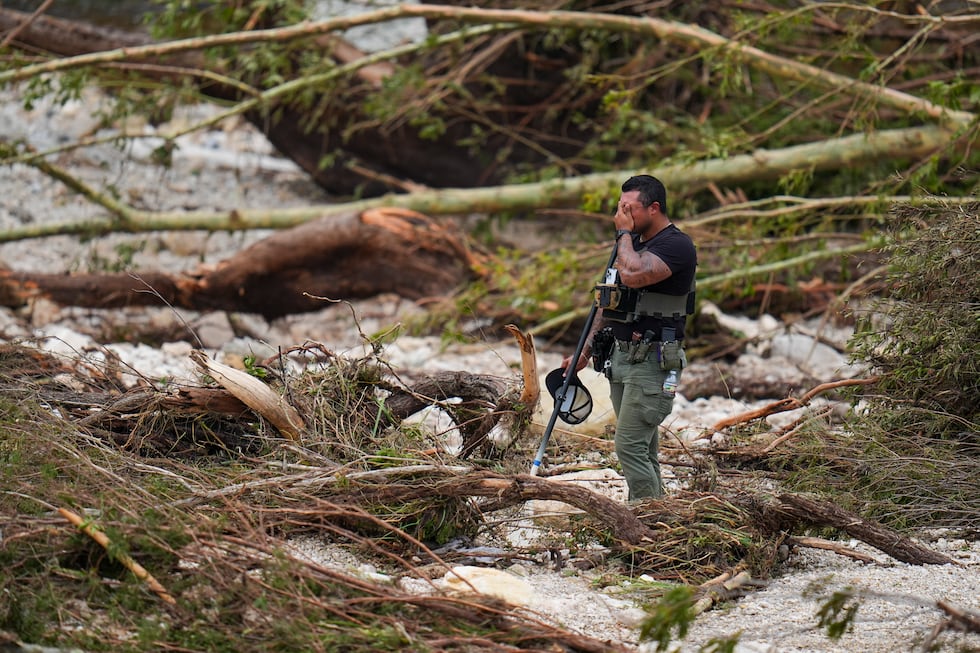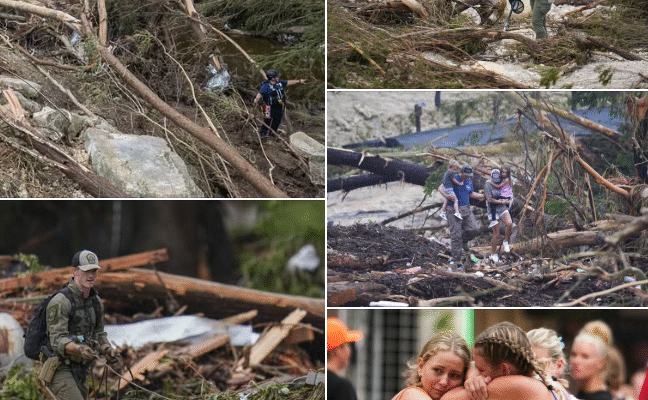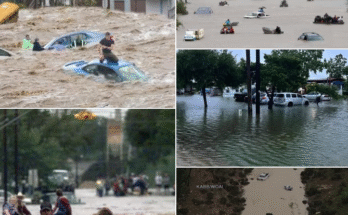as sheriff says 10 campers remain missing
Families returned to Camp Mystic on Sunday, sifting through the waterlogged remains of cabins and personal belongings at the once-vibrant all-girls summer camp now devastated by deadly flash floods. The flooding, which swept homes from their foundations, has killed at least 82 people across central Texas and left dozens more missing.
Rescue crews continued a grueling search through rugged terrain, deep waters, and snake-infested areas—including sightings of water moccasins—in hopes of locating the missing. Among them are 10 young campers and a counselor from Camp Mystic, whose families cling to hope amid mounting grief.
For the first time since storms began battering the state, Governor Greg Abbott confirmed that 41 people remain unaccounted for—a number that could rise as rescue operations expand.
In Kerr County, home to Camp Mystic and several other youth camps in the Texas Hill Country, authorities have recovered 68 bodies, including 28 children, Sheriff Larry Leitha reported. He vowed to continue the search “until everybody is found.” Additional fatalities have been confirmed in Travis, Burnet, Kendall, Tom Green, and Williamson counties, officials said.
More Rain Ahead
Governor Abbott warned that another round of heavy rainfall—expected through Tuesday—could bring further life-threatening flooding, especially in areas already saturated. While speaking at a news briefing in Austin, emergency alerts lit up mobile phones in Kerr County with warnings of high risk for river flooding. Nearby, a loudspeaker near Camp Mystic urged people to evacuate, though local authorities quickly clarified there was no immediate danger on site.
Scenes of Grief and Recovery
Beginning Sunday morning, families were allowed to return to Camp Mystic to search for mementos and say quiet goodbyes. One young girl was seen emerging from a building, cradling a large camp bell—a symbol of the joyful routines that once defined camp life.
A father walked along the riverbank, scanning clumps of trees and lifting rocks—his daughter had been rescued from a cabin on the camp’s highest ground.
Nearby, a woman and a teenage girl, both clad in rubber waders, stepped inside a damaged cabin next to a heap of soaked mattresses, a toppled storage trunk, and scattered clothes. Moments later, they doubled over in tears and embraced tightly.
Another family gently carried a blue footlocker back to their car. Inside, a teenage girl gazed out of the open window, tears streaming down her face, silently taking in the wreckage as they drove away.
This weekend’s flooding has left a deep wound on Texas communities—especially those who sent their daughters to Camp Mystic for summer memories, never imagining such loss. With more rain on the horizon, the danger is far from over. But for the families who returned to the camp Sunday, the grief is already overwhelming, and the wait for answers continues.

As families returned to witness the devastation at Camp Mystic for the first time, search crews nearby worked relentlessly, using heavy machinery to clear massive tree trunks and tangled branches from the raging river in hopes of uncovering signs of life—or loss.
With each passing hour, the chances of finding more survivors diminished. Despite warnings from authorities, some families of the missing and determined volunteers combed the riverbanks themselves, unwilling to wait for answers.
Questions Mount Over Warnings and Preparedness
Officials now face growing scrutiny over whether adequate flood warnings were issued in this region—an area long known to be vulnerable to sudden and severe flash floods—and whether more could have been done in advance to protect lives.
Federal Response
On Sunday, President Donald Trump signed a major disaster declaration for Kerr County, enabling federal assistance through the Federal Emergency Management Agency (FEMA) to begin flowing into Texas.
Speaking to reporters before departing his Bedminster, New Jersey golf club to return to Washington, Trump said he intends to visit the area Friday.
“I would have done it today, but we’d just be in their way,” he said. “It’s a horrible thing that took place—absolutely horrible.”
A River Rises in the Dark
The sheer force and speed of the disaster has stunned officials and locals alike. Before dawn Friday, the river surged a staggering 26 feet (8 meters) in just 45 minutes, sweeping away homes, campsites, and vehicles as it tore through the Hill Country with little warning.
Though the sun was out Sunday, the threat was far from over. Flash flood watches remained in effect, and additional rain continued falling across central Texas, further complicating rescue efforts.
Search and Rescue Efforts
Search teams have deployed helicopters, boats, and drones to scour the area—plucking stranded survivors from trees and reaching isolated camps and homes cut off by washed-out roads.
Officials confirmed that in the first 36 hours following the flood, more than 850 people were rescued.
As the search continues and the community begins to process the enormity of the loss, Texas stands on edge—grieving, questioning, and bracing for what may come next.








